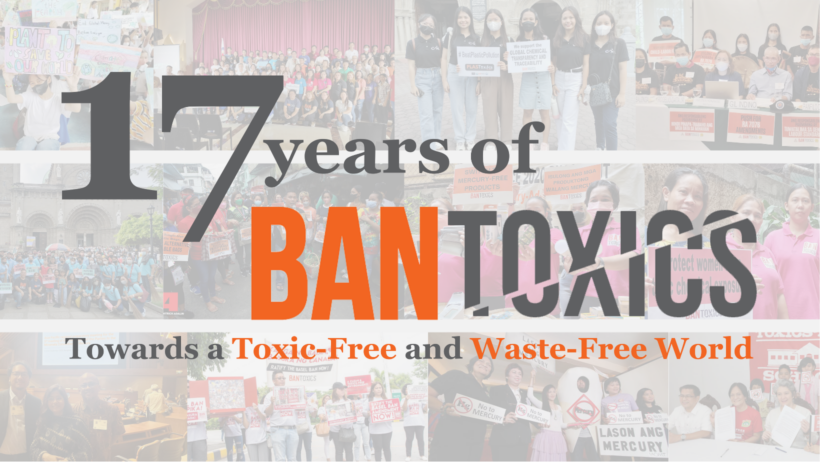Independent, non-profit, non-governmental environmental organization BAN Toxics celebrates its 17th founding anniversary on October 11, taking stock of past milestones and acknowledging the pivotal role of relevant research and science-based policy recommendations on environmentally sound management of chemicals and waste. With the goal of advancing environmental justice, the NGO emphasizes during its anniversary its partnerships and solidarity with vulnerable populations and diverse groups, as well as critical collaboration with government and international development organizations, for its success.
“BAN Toxics has established itself in the last 17 years as a key player in advancing the Philippines and the region toward a toxic-free and waste-free environment while steadfastly promoting the human rights of the most marginalized sectors in society. It has consistently participated and submitted recommendations at international conferences on environmental issues, aimed at reducing and eliminating the use of toxic chemicals,” the NGO’s Executive director, Rey San Juan said.
The environmental watchdog has contributed to policy-making through a series of investigative studies and research initiatives in its portfolio, informing government regulations and community-based knowledge. It has played a pivotal role in the Philippines’ ratification and implementation of the Minamata Convention on Mercury, and in shaping subsequent guidelines formulation of government agencies.
This aspect of the organization has gained recognition on the global international stage. “BAN Toxics’ commitment and action research approach on important global and regional issues, such as the hazardous waste trade and mercury, have been instrumental in shaping policy and community-driven projects for positive change on the ground,” said Rico Euripidou of groundWork, an environmental justice organization in South Africa.
“Over the years, BAN Toxics has worked for the protection of social and environmental human rights, including the right to know about toxic chemicals in products, which has contributed significantly to a safer and more sustainable future. Its dedication to research and awareness-raising has undoubtedly made a difference in many people’s lives in the Philippines,” read the solidarity statement of Olga Speranskaya and Alexandra Caterbow of HEJSupport, a health and environment justice support group based in Germany.
Senior Policy Advisor, Andreas Prevodnik of the Swedish Society for Nature Conservation considers BAN Toxics “a long-standing partner” seeing its “growth in its important and constructive role of working for a toxics-free and combating environmental and social injustices nationally, regionally, and globally over the years. Its dedicated research and work, for example, when it comes to phasing out mercury in small-scale gold mining, and the safety of consumer products, have made real on-the-ground differences in the Philippines, and beyond.”
The European Environment Bureau (EEB) and Zero Mercury Waste Group (ZMWG) echo the same appreciation for BAN Toxics’ partnership with them to achieve zero mercury pollution in the Philippines and worldwide, specifically citing the close cooperation among the NGOs towards the phasing out of mercury-added products in the Philippines, including the campaign against skin-lightening creams.
Charlie Brown of the World Alliance for Mercury-Free Dentistry was honored to have BAN Toxics as its partner in the Philippines. saying, “We salute your success in ending the scourge of dental amalgam in the Philippines and your impact on social and environmental justice extends far across Asia and the Pacific.”
Bangladesh-based Environment and Social Development Organization (ESDO) further commends the organization’s “dedication to environmental justice, advocacy for sound management of chemicals, and exposing harmful practices.”
The East Avenue Medical Center – Toxicology Referral and Training Center highly values the collaborative efforts it has undertaken with BAN Toxics noting the shared dedication to the well-being of communities in the pursuit of a safer and healthier environment for all.
The Center for Cosmetics and Household Urban Hazardous Substances of the Food and Drug Administration (FDA) in the same vein lauds the organization for “spearheading various meaningful environmental advocacies on chemical safety among consumers and vulnerable groups”.
One of the group’s media partners, PRESSENZA International Press Agency, highlights the campaigns of BAN Toxics to reduce and eliminate harmful chemicals, especially on women, children, and the marginalized, as “relevant in helping to build a better, more humane world that puts the needs of human beings first”.
The group was founded in 2006 in response to pressing toxic waste issues in the Philippines. It was established by public interest lawyer Richard Gutierrez, whose work with US-based Basel Action Network (BAN) inspired the creation of a similar organization in the global south, which was disproportionately affected by hazardous waste trade.
BAN Toxics stays relevant by remaining rooted in social realities and understanding the interconnectedness of communities, countries, and regions. It has been a vocal advocate on critical issues, such as toxic waste trade from developed countries and international economic agreements, to ensure that developing countries in the region do not bear a disproportionate burden of pollution.
Philippine-based NGO BUKLOD-TAO extends its greetings and solidarity with BAN Toxics, stating that, “Ang BAN Toxics ay palagiang nasa larangan ng mga kampanya para protektahan ang mga mamamayang Pilipino laban sa mga “toxic” na kemikal. Isang kapuri-puring adhikain.” (“BAN Toxics is always in the field of campaigns to protect the Filipino people against “toxic” chemicals. A laudable aspiration.”)
San Juan emphasized the organization’s commitment to community empowerment, stating, “We will continue to develop local and regional initiatives through research, advocacy and campaign, policy dialogue with government, and meaningful engagement with grassroots organizations to actively exchange information and expertise for community empowerment.”
The environmental group has directly engaged with artisanal small-scale gold miners in various parts of the country and played a significant role in building the current national federation of the sector. BAN Toxics collaborates closely with local, national, and international environmental NGOs, intergovernmental organizations, and academic institutions using both local and international campaigning, capacity-sharing and bridge-building between activists in Asia, and across the world. #










